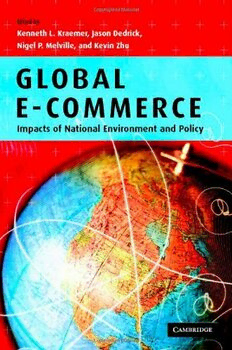Table Of ContentGlobal e-Commerce
Are the Internet and e-commerce truly revolutionizing business practice?
This book explodes the transformation myth by demonstrating that the
Internet and e-commerce are in fact being adapted by firms to reinforce
their existing relationships with customers, suppliers, and business part-
ners.Detailedcasestudiesofeightcountriesshowthat,ratherthancreating
a borderless global economy, e-commerce strongly reflects existing local
patternsofcommerce,business,andconsumerpreference,anditsimpact
therefore varies greatly by country. Paradoxically, while e-commerce is
increasing the efficiency, effectiveness, and competitiveness of firms, it is
alsoincreasingthecomplexityoftheirenvironmentsastheyhavetodeal
withmorebusinesspartnersandalsofacegreatercompetitionfromother
firms.Thisincisiveanalysisofthediffusionandimpactofe-businesspro-
videsacademicresearchers,graduates,andMBAstudentswithasolidbasis
forunderstandingitslikelyevolution.
Kenneth L. Kraemer isProfessoratthePaulMerageSchoolofBusi-
ness and at the Donald Bren School of Information and Computer Sci-
ence, University of California, Irvine. He is also Director of the Center
forResearchonInformationTechnologyandOrganizations(CRITO)and
DirectorofthePersonalComputingIndustryCenter(PCIC).
Jason Dedrick is Co-Director of the Personal Computing Industry
Center and Senior Research Fellow at CRITO, University of California,
Irvine.
Nigel P. Melville is Assistant Professor of Business Information
Technology at the Stephen M. Ross School of Business, University of
Michigan.
Kevin Zhu isAssociateProfessorattheRadySchoolofManagement,
UniversityofCalifornia,SanDiego.
Global e-Commerce
Impacts of National Environment
and Policy
Editedby
kenneth l. kraemer
jason dedrick
nigel p. melville
kevin zhu
Cambridge, New York, Melbourne, Madrid, Cape Town, Singapore, São Paulo
Cambridge University Press
TheEdinburghBuilding,Cambridge,UK
Published in the United States of America by Cambridge University Press, New York
www.cambridge.org
Information on this title: www.cambridge.org/9780521848220
© Cambridge University Press 2006
Thispublicationisincopyright.Subjecttostatutoryexceptionandtotheprovisionof
relevant collective licensing agreements, no reproduction of any part may take place
without the written permission of Cambridge University Press.
Firstpublishedinprintformat 2006
- ---- eBook (NetLibrary)
- --- eBook (NetLibrary)
- ---- hardback
- --- hardback
Cambridge University Press has no responsibility for the persistence or accuracy of s
forexternalorthird-partyinternetwebsitesreferredtointhispublication,anddoesnot
guaranteethatanycontentonsuchwebsitesis,orwillremain,accurateorappropriate.
Contents
List of figures page vii
List of tables ix
List of boxes xiv
Notes on contributors xv
Introduction 1
KennethL.Kraemer,JasonDedrick,and
NigelP.Melville
1 Globalizationandnationaldiversity:e-commerce
diffusion and impacts across nations 13
KennethL.Kraemer,JasonDedrick,and
NigelP.Melville
2 TheUnitedStates:adaptiveintegrationversustheSilicon
Valley model 62
JasonDedrick,KennethL.Kraemer,JohnL.King,and
KalleLyytinen
3 France: an alternative path to Internet-based e-commerce 108
EricBrousseauandBrunoChaves
4 Germany:a“fastfollower”ofe-commercetechnologies
and practices 141
WolfgangKoenig,RolfT.Wigand,andRomanBeck
5 Japan: local innovation and diversity in e-commerce 173
DennisS.Tachiki,SatoshiHamaya,andKouYukawa
6 China: overcoming institutional barriers to e-commerce 209
Zixiang(Alex)TanandOuyangWu
v
vi Contents
7 Taiwan:diffusionandimpactsoftheInternetand
e-commerce in a hybrid economy 247
Tain-JyChen
8 Brazil: e-commerce shaped by local forces 278
PauloBastosTigre
9 Mexico:globalengagementdrivinge-commerceadoption
and impacts 306
JuanJ.Palacios
10 Globalconvergenceandlocaldivergenceine-commerce:
cross-country analyses 345
KevinZhu,SeanXu,KennethL.Kraemer,
andJasonDedrick
APPENDICES
I – Data collection and survey instrument 385
II – GEC Survey measures by sector and size 404
III – GEC Survey measures by country 413
Index 429
Figures
1.1 Conceptualframework page16
1.2 Degreeofglobalizationoffirmsineacheconomy 23
1.3 E-commercediffusionandwealth 24
1.4 Internet-basede-commercediffusion,1998–2003 34
1.5 Firmusesofe-commerce 36
1.6 Useofe-commercebyhighglobalandhighlocal
firms 38
1.7 E-commerceusesacrosseconomies 40
1.8 B2BandB2Ce-commerceinhighlocalandhigh
globalfirms 43
1.9 FirmsengagedinB2BandB2Cbyeconomy 45
1.10 Firmimpactsfrome-commerce 48
1.11 Performanceimpactdifferencesbetweenhighglobal
andhighlocalfirms 49
1.12 Impactonvaluechainandcompetition 50
2.1 Useofe-commercetechnologies:USandglobalfirms 75
2.2 EnterpriseintegrationinUSfirms,2002 78
2.3 DriversforInternetusefore-commerce,2002 80
2.4 BarrierstoInternetusefore-commerce(percent
indicatingbarrierisasignificantobstacle) 83
2.5 ImpactsfromuseoftheInternetfore-commerce 98
4.1 Useofe-commercetechnologies 150
4.2 E-commercedrivers 154
4.3 E-commercebarriers 157
4.4 Internet-basede-businessdiffusion,1998–2003 159
4.5 UseoftheInternet 161
5.1 Analyticalframework 177
5.2 E-commercereadiness–enterpriseintegration 187
5.3 E-commercedriversforInternetuse 189
5.4 E-commercebarrierstoInternetuse 192
5.5 E-commerceadoption–typesofuse 201
vii
viii Listoffigures
6.1 Useofe-commercetechnologies 223
6.2 Integrationmode 226
6.3 E-commercedrivers 229
6.4 E-commercebarriers 232
6.5 E-commercediffusion 236
7.1 Useofe-commercetechnologies 255
7.2 Integrationmode 258
7.3 E-commercedrivers 260
7.4 E-commercebarriers 262
7.5 E-commercediffusion 266
8.1 Useofe-commercetechnologies 286
8.2 E-commercereadiness–enterpriseintegration 288
8.3 E-commercedriversofInternetuse 290
8.4 BarrierstoInternetusefore-commerce 293
8.5 E-commerceadoption–typesofuse 295
9.1 Integrationmode 318
9.2 Driversofe-commercediffusion 323
9.3 Barrierstoe-commercediffusion 326
9.4 Internetpenetrationbyfirmsize 328
9.5 UseoftheInternet 330
10.1 Conceptualmodel 348
10.2 Developedvs.developingeconomies 357
10.3 Researchofe-commercediffusion 358
10.4 ResearchstreamI:e-commerceadoption 362
10.5 ResearchstreamII:frome-commerceadoption
touse 366
10.6 ResearchstreamIII:frome-commerceusetoimpacts 370
Tables
1.1 Conceptualframework page18
1.2 GECSurveysample 20
1.3 Macroeconomicindicators,2002 26
1.4 Technologyindicators,2002 28
1.5 Firmdriverstoe-commerceuse 31
1.6 Firmbarrierstoe-commerceuse 31
1.7 B2BandB2Csalesandservices 41
2.1 Macroeconomicindicators,1998–2002 67
2.2 InternationalizationofUSfirms 68
2.3 Technologyinfrastructure,1998–2002 69
2.4 Informationinfrastructure,1995–2002 72
2.5 Useofe-commercetechnologiesinUSfirms,2002 74
2.6 InvestmentinITbyUSfirms,2002 76
2.7 Enterpriseintegrationstrategy,2002 77
2.8 Driversofe-commerce 79
2.9 Barrierstoe-commerce 82
2.10 USshipmentsande-commerce,2002(billionsof
dollars) 84
2.11 ToptwentyUSInternetretailers,2000 86
2.12 UsesoftheInternet,2002 89
2.13 Firmonlinesalesandprocurement 90
2.14 Onlineservices,2002 91
2.15 HowfirmsusetheInternettosellproductsand
services 92
2.16 ParticipationinanInternet-basedtrading
community,2002 93
2.17 Impactsofdoingbusinessonline,2002 96
2.18 Associationbetweenexternalintegrationandcosts 97
2.19 Changesinfirms’environmentsinceusingthe
Internet 100
ix

